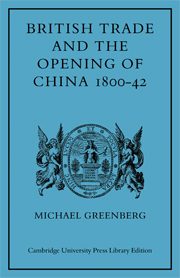Book contents
- Frontmatter
- Contents
- Money, Weights and Abbreviations
- Author's Preface
- CHAPTER I THE OLD CHINA TRADE
- CHAPTER II THE HONOURABLE COMPANY AND THE PRIVATE ENGLISH
- CHAPTER III THE CANTON COMMERCIAL SYSTEM
- CHAPTER IV THE DEVELOPMENT OF THE CANTON TRADE TO 1834
- CHAPTER V OPIUM
- CHAPTER VI BUSINESS AND FINANCIAL ORGANISATION
- CHAPTER VII THE VICTORY OF THE FREE TRADERS
- CHAPTER VIII LEDGER AND SWORD
- APPENDICES
- Bibliography
- Index
CHAPTER III - THE CANTON COMMERCIAL SYSTEM
Published online by Cambridge University Press: 07 October 2011
- Frontmatter
- Contents
- Money, Weights and Abbreviations
- Author's Preface
- CHAPTER I THE OLD CHINA TRADE
- CHAPTER II THE HONOURABLE COMPANY AND THE PRIVATE ENGLISH
- CHAPTER III THE CANTON COMMERCIAL SYSTEM
- CHAPTER IV THE DEVELOPMENT OF THE CANTON TRADE TO 1834
- CHAPTER V OPIUM
- CHAPTER VI BUSINESS AND FINANCIAL ORGANISATION
- CHAPTER VII THE VICTORY OF THE FREE TRADERS
- CHAPTER VIII LEDGER AND SWORD
- APPENDICES
- Bibliography
- Index
Summary
When the private British merchants came to Canton they found themselves obliged to fit into the existing Chinese system of arrangements, commercial, fiscal and quasi-political. This system, which had become definitively crystallised and legalized by 1760 and which lasted with only one break until 1842, was highly peculiar. It therefore impressed travellers like Toogood Downing, who, along with such garrulous Old China Hands as Hunter, have given us detailed descriptions of the old, ‘pre-treaty days’ regime. Moreover, this system so profoundly conditioned the ‘old’ trade and so obviously constituted that which the Treaty of Nanking sought to change that every writer on ‘the opening of China’ has had perforce to deal with it, however summarily. But these accounts have been distorted, even when elaborately drawn up as by Morse, because they have been based principally on the practice of the East India Company, whose position in and attitude to the Canton System differed in a number of ways from that taken up by the private merchants. Supplementary material for a more rounded picture, as well as a fresh angle of vision, is provided by the records of the ‘free merchants’.
The Canton System was not the outcome of treaty or diplomatic restrictions, but arose entirely from a unilateral Chinese policy towards foreign trade and traders. The latter found that policy, the policy of the ‘closed door’ as it were, extremely irritating. They strove to explain this perplexing denial of the axiomatic benefits which exchange of ‘goods’ brought, by the perversity of the Chinese ‘character’; thus founding a tradition of explanation in terms of jejune generalisations about oriental psychology, which has impaired most Western attempts at causal analysis of China's development.
- Type
- Chapter
- Information
- British Trade and the Opening of China 1800–42 , pp. 41 - 74Publisher: Cambridge University PressPrint publication year: 1970

